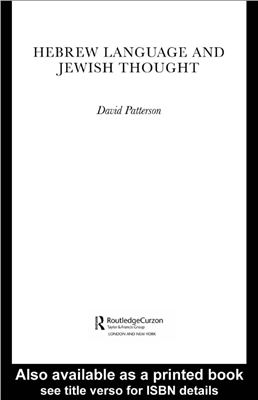Hebrew Language and Jewish Thought. Contributors: David Patterson -
author. Publisher: Routledge Curzon. Place of Publication: London.
Publication Year: 2005. Page Number: 242.
What makes Jewish thought Jewish? This book proceeds from a view of the Hebrew language as the holy tongue; such a view of Hebrew is, indeed, a distinctively Jewish view as determined by the Jewish religious tradition. Because language shapes thought and Hebrew is the foundational language of Jewish texts, this book explores the idea that Jewish thought is distinguished by concepts and categories rooted in Hebrew.
Drawing on more than 300 Hebrew roots, the author shows that Jewish thought employs Hebrew concepts and categories that are altogether distinct from those that characterize the Weste speculative tradition. Among the key categories that shape Jewish thought are holiness, divinity, humanity, prayer, responsibility, exile, dwelling, gratitude, and language itself.
While the Hebrew language is central to the investigation, the reader need not have a knowledge of Hebrew in order to follow it. Essential reading for students and scholars of Judaism, this book will also be of value to anyone interested in the categories of thinking that form humanity's ultimate conces.
What makes Jewish thought Jewish? This book proceeds from a view of the Hebrew language as the holy tongue; such a view of Hebrew is, indeed, a distinctively Jewish view as determined by the Jewish religious tradition. Because language shapes thought and Hebrew is the foundational language of Jewish texts, this book explores the idea that Jewish thought is distinguished by concepts and categories rooted in Hebrew.
Drawing on more than 300 Hebrew roots, the author shows that Jewish thought employs Hebrew concepts and categories that are altogether distinct from those that characterize the Weste speculative tradition. Among the key categories that shape Jewish thought are holiness, divinity, humanity, prayer, responsibility, exile, dwelling, gratitude, and language itself.
While the Hebrew language is central to the investigation, the reader need not have a knowledge of Hebrew in order to follow it. Essential reading for students and scholars of Judaism, this book will also be of value to anyone interested in the categories of thinking that form humanity's ultimate conces.

